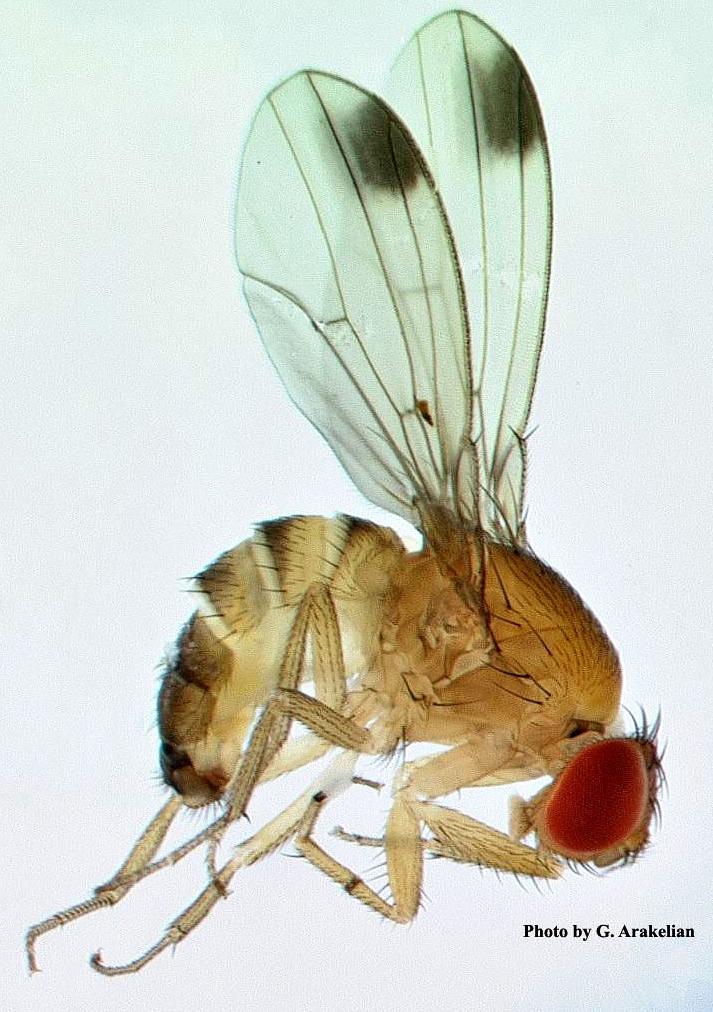By LANE BLACKMER
Capital News Service
LANSING—A new invasive fly has Michigan researchers working to protect next season’s fruit crop.

(University of California, Riverside)
Almost $20,000 of federal money went to Michigan State University for early detection and rapid response of the spotted wing drosophila, a small but damaging insect similar to a fruit fly.
“This is the first that we’ve had it here so we don’t know what the impact is going to be on the fruit industry,” said Keith Mason, a research assistant for the project. “We’re at the stage where they’re trying to find out where it is.”
The insect, Mason said, was found in Southwest Michigan in late September—too late in the 2010 growing season to do any damage.
Mason said the pest hasn’t been found yet in Northern Michigan but could affect fruit-growing areas like Traverse City.
Although the spotted wing drosophila doesn’t spread disease, Mason said, it’s more destructive to crops than an average fruit fly because its egg-laying appendage can cut through fruit.
The fly, he says, affects all fruits but seems to be most attracted to blueberries, raspberries and strawberries.
Mason said California and Oregon were the first states to see the insect in 2009 and suffered large crop losses.
Mason said Michigan will fare better because a pesticide to kill the insect is available and the state’s growers often use pesticides.
If the spotted wing drosophila can survive Michigan winters, Mason said, growers need to be educated on how to deal with it.
Michigan blueberry growers rank first in the nation, according to the National Agricultural Statistics Service. Blueberries are also one of the crops the spotted wing drosophila is most attracted to.
Bob Carini, a blueberry grower in West Olive, said he worries that monitoring and using pesticides will be costly.
“It’s definitely going to mean more work for the growers as far as monitoring and stuff like that,” he said. “It’s fairly expensive
because you have to have a trained scout that’s out there looking.”
Carini said pesticides are used based on types of insects and how many of those insects are captured.
Dave Trinka, director of research for MBG Marketing-The Blueberry People in Grand Junction, said it’s an expense growers haven’t seen before.
“We will have to employ thousands of monitoring traps, so that is an expense which we have not had to do before,” he said. “But we feel pretty confident after speaking to blueberry growers where this pest has been present that it has been, by and large, effectively controlled.”
The quality and taste of blueberry yields is another thing Carini worries about.
But he still expects Michigan fruit growers to handle the situation well.
“From my perspective, with monitoring and control methods we should be able to deal with it very well to help produce the quality blueberries,” he said.
Linda Jones, executive director of the Michigan Grape and Wine Industry Council, said she’s unsure whether the insect will taint the taste of wine but hopes to create awareness of how to deal with it as researchers find out more.
Bryan Ulbrich, owner of Left Foot Charley Winery and Tasting Room in Traverse City, said his growers don’t typically use pesticides on vineyards. He said he’s not too worried, but if the insect proves destructive, he will consider using pesticides.
“We might not chose to risk the entire ecosystem of the vineyard,” he said.
Craig Cunningham, vineyard manager of Cunningham Viticultural Services in Traverse City, said he is more worried about a fungus associated with fruit flies than the insect itself.
“If that drosophila fly would come here and start being the damager of fruit and not this disease, then of course I would consider some kind of control,” he said. “But right now, as far as I know, that fruit fly is not up here.”
Cunningham said he thinks the possibility of it showing up in Northern Michigan is slim.
Mason said there will be efforts to educate growers on how to monitor and use pesticides for the fly at the December Great Lakes Fruit, Vegetable and Farm Market EXPO in Grand Rapids.
© 2010, Capital News Service, Michigan State University School of Journalism. Not to be reproduced without permission.